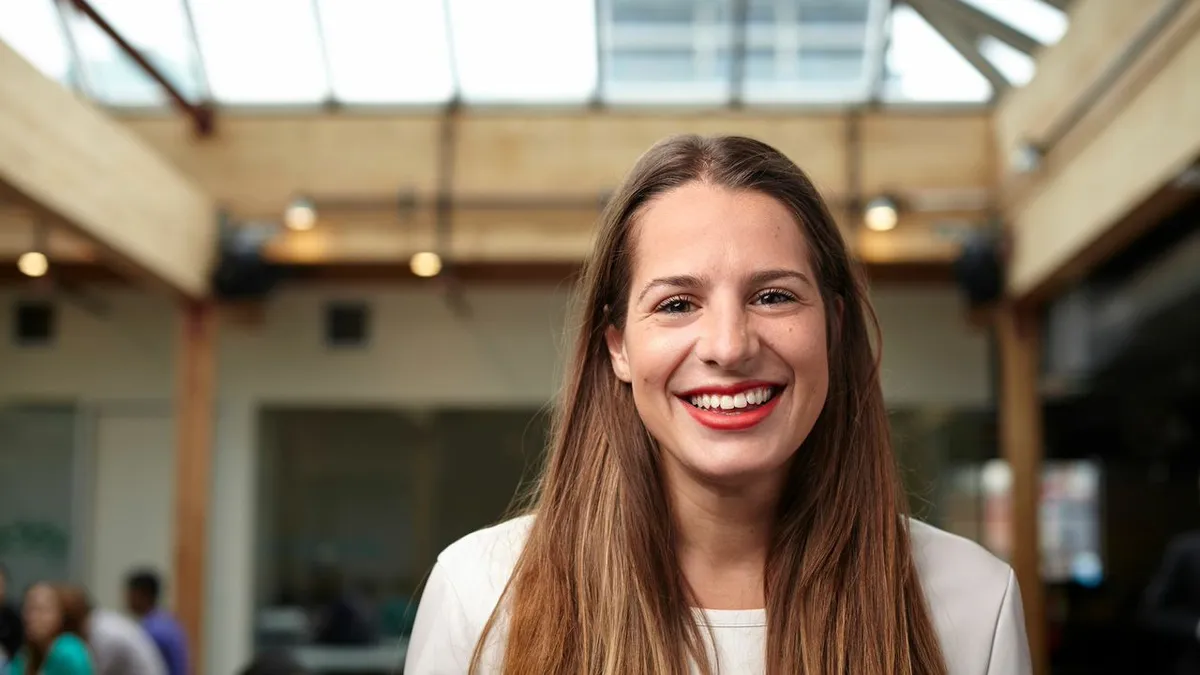The majority of people working in high-demand STEM jobs are male, an issue that has gained increasing attention as educators in higher ed and K-12 have increased their focus on attracting more women to high-demand majors like computer science. Let's face it: There's a general perception that programmers and their ilk are nerdy and socially awkward.
One alternative education provider may have the answer, though.
According to Galvanize, its San Francisco campus — one of six nationwide — has achieved a 50-50 split of male and female students. By comparison, the U.S. Census Bureau's American Community Survey found that women make up only 24% of the STEM workforce. To find out more about what Galvanize did to "level up" its female student population and what programs in traditional higher ed can learn, Education Dive recently caught up with its people and culture director, Bruna Maia.
EDUCATION DIVE: One of the big concerns regarding high-demand STEM fields has been the disproportionate amount of men compared to women, but you all have raised that ratio in your San Francisco cohort to around 50%. What sort of approach did it take to get there?
BRUNA MAIA: It kind of happened a little bit organically. I think the founders, from day one, were really passionate about hiring women in our team, so having that type of diversity as we were building up the team allowed our network to grow that way. Soon, we were having a lot of female founders in our space just from our network, and then those female founders, of course, told their friends and their developers to start applying to our programs, and it kind of spread.
So I think that was very much ingrained from day one — and we’re really committed to diversity partnerships. For example, in our San Francisco campus, we have Women Who Code that are working out of here. We have Glassbreakers, which is female-founded. And on top of that, it’s about having female mentors. So if we have all of those resources in place, I think, naturally, women are going to feel comfortable coming here and working out of here every day, and they’re going to be drawn to our program.
Have you noticed a similar ratio for minority students in your programs?
MAIA: Yeah. We’re definitely working with that, because the same goes for minorities. We’re looking at partnerships. We’re looking at other people in the industry that are already doing that and already making progress and partnering with them. I think that in order for us to tackle this issue in Silicon Valley and in the larger U.S., we need to be working together, because there’s plenty of people who are doing excellent work, and we want to just bring them in and bring in their good work.
I think one of the things to on our campus, when we’re talking about minorities, it is important to feel like we’re bringing people from all around the world as well, and giving startups the opportunity to work out of here that wouldn’t necessarily have a place to congregate and have access to all of these mentors and events, as well. A few areas where we are working to bring in more students and more diversity are definitely around veterans, black developers, and of course, as you mentioned, women.
Traditionally, STEM jobs have kind of been seen as a “boys’ club.” What advice would you give to administrators at colleges and universities who want to see the same kind of results on their own campuses?
MAIA: I think it comes a lot to role models. What are the types of mentors, and board members even, in your university that you’re including? Once people are applying to programs, they want to find a cultural perspective that is compatible to what they’re going through in their lives. I think the key here is finding common ground, as well. Having an open space where people, even though they come from different backgrounds, can find a common thread. That’s going to help them succeed anywhere they go. The world is full of diversity no matter what, and there’s going to be tons of challenges for them to take on when they get into the industry, so getting to know how to find that common ground is so important.
With alternative pathways to credentials gaining steam, have you all seen increased interest from employers? Do you think tech fields in particular are perhaps more willing to embrace this model than others?
MAIA: That is definitely the culture that we are creating at Galvanize — this idea of the lifelong learner — and that we want our employees always to be leveling up in their own skills. That’s where our workshops come in. We’ll be hosting a lot of entrepreneurial workshops, design workshops, even more technical workshops at night, allowing our own employees to take them and gain more knowledge and skills around what they’re doing.
I do think the tech industry is a lot more open to that, but we’re expanding to a lot of different areas and creating campuses where it’s not heavily tech-focused like San Francisco. We are gonna be recruiting a diverse employee base that has different backgrounds, not just in tech. I feel like if we can instill that type of culture within our own team, that will potentially create a standard for them to share with their friends and their families that their experience with Galvanize was this way.
Would you like to see more education news like this in your inbox on a daily basis? Subscribe to our Education Dive email newsletter! You may also want to read Education Dive's look at how humanities deans are coping with a shifting value proposition.


















